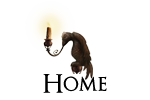I'd better come clean here. I'm not a great fan of classic space science fiction. It doesn't speak to my heart, somehow--maybe I just haven't tried hard enough to love it as much as I do high fantasy. So why have I chosen to review WE, whose back cover blurb starts with the very sci-fi sentence "In the furthest, coldest, darkest reaches of our solar system, Paul Munro is on a mission from which he can never return."? Well, for one thing it's by John Dickinson, whose previous books I have loved, for a second, it's longlisted for the CILIP Carnegie Medal 2011, and for a third, I kept catching glimpses of high praise for it here and there on the social networks. I definitely wanted to give it a go.
WE inserted itself into my consciousness without my really realising it--and that's a strange thing, given what the book's title actually translates as. WE is the World Ear, and every human on Earth is plugged into it. It runs and rules their consciousnesses. Want a fact?--just think it, and the WE will come back with an answer. Want an image? A list? A personal communication? The WE will provide. It rules every aspect of human life. Imagine that--and then imagine it being taken away. Worse, imagine waking up a million billion miles from everything you've ever known, and having to live with people--other humans, yes--but who look and think so differently from you as to be almost alien. People who communicate with their voices, not their minds. People with hidden secrets and maybe hidden agendas. What then? That is what Paul Munro has to contend with when he arrives on his desolate, icy moon home.
WE is published by David Fickling Books, but it's certainly not a children's book per se. I'd give it to an older teenager--indeed it's on Lovely Daughter's summer holiday pile already. But I'd also recommend it for adults. It's a book which made me think a lot, not least about how we modern humans relate to the other people around us, both near and far--and how our social communications patterns have already changed beyond recognition from, let us say, fifteen or twenty years ago. It wasn't particularly comfortable thinking, either. But although it is certainly bleak in both subject matter and setting, it's not a book without hope. I liked it very much indeed, partly because its subject and tone IS so very different from my usual reading matter. It's also made me think that perhaps I should give sci-fi another chance after all.
Now, as will become apparent with all my forays into reviewing, I am reader who always has questions for the author. John was kind enough to agree to answer one of mine. So here he is with a reply to my
BURNING QUESTION
SCC: Given the startling and rapid rise of social networking and technology in the last five years, it isn't hard to imagine a progression to something like the World Ear. Do you think it is essential for authors to spend part of their time interacting with their readers via social networks such as Facebook and Twitter, or do you think we are getting sucked into something dangerously addictive, which will eventually drain all the creativity out of us?"
John D: That's an interesting question Lucy, though I think the interesting bit is more to do with creativity than with the relentless advance of technology.
How would creativity happen in a society shaped by on-line networking, as I have imagined in WE? Our experience would be such that we would not really think of ourselves as 'I' but as ' a part of WE'. That would determine the kind of things we wanted to create. There would still be creativity, I think, but it would be more likely to be a mass creativity, such as you see whan a crowd starts a Mexican wave or a group of people burst out singing and naturally find a harmony. The individual artist might still exist but their work would be hard to understand. And no one would seek them out on Facebook or Twitter. Why should they? Celebrity would be dead. Nobody would want, in any sense, to be that person. Because 'a person' would no longer be what we were.
SCC: Thank you, John. I'll have to go away and think about all that some more now!



















2 comments:
What a great book to review for the British Books Challenge, Lucy! I've read WE and was tremendously impressed by it. Elegant, chilly, thought-provoking - John Dickinson is a very, very good writer.
Ooh I am so excited to read this now. A human ear which we are all tapped into to... I am slightly freaked out by the idea and totally intrigued. What a fab review!
Post a Comment